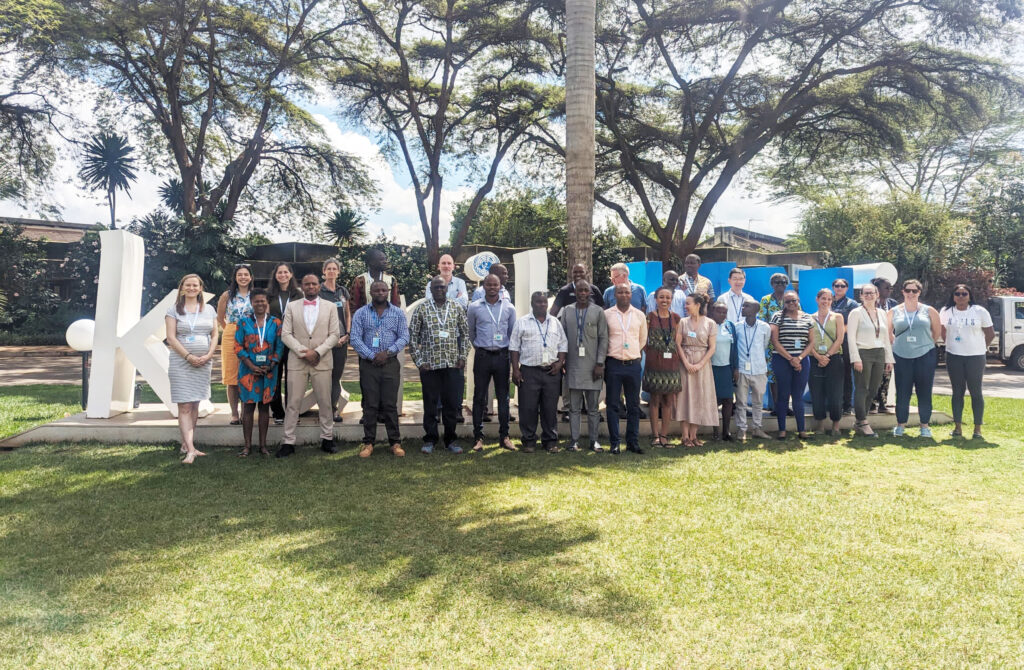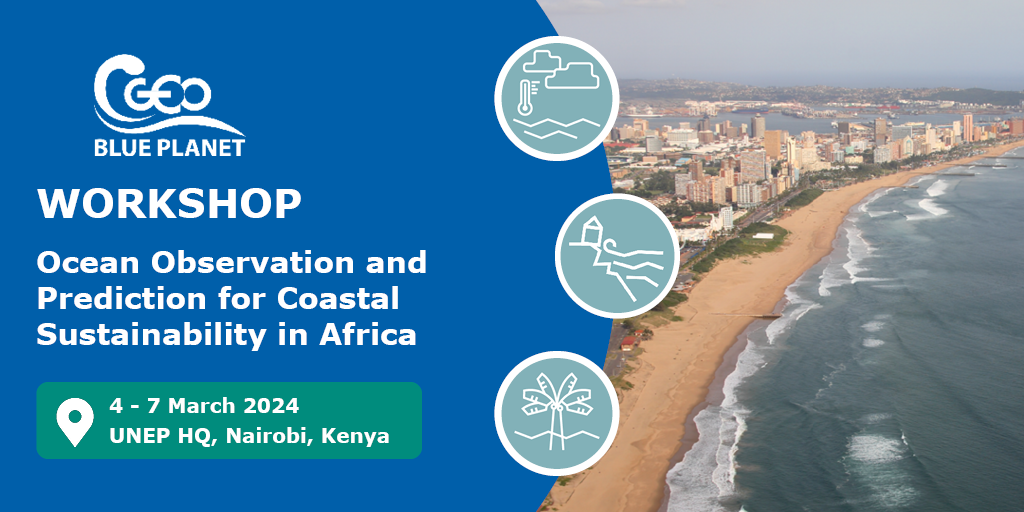In the framework of the GEO Blue Planet initiative, Mercator Ocean International in collaboration with UNEP organised a four-day workshop from 4 to 7 March 2024, entitled, “Ocean observation and prediction for coastal sustainability in Africa”. The workshop took place at the UN Office at Nairobi (UNON), bringing together 58 participants from 17 countries representing multiple stakeholder groups from the UN, regional and international bodies, national agencies, research and civil society organisations, and the private sector.
The workshop builds on the coastal dialogue initiated at the GEO Blue Planet 5th Symposium held in Accra in October 2022, particularly developing a GEO Blue Planet-led activity focused on harnessing Earth observation (EO) intelligence towards coastal resilience, sustainable coastal development and management in Africa. Within this context, the Nairobi workshop explored challenges and opportunities to leverage Ocean and coastal observations in responding to the emerging needs of multiple stakeholders, aligned with the goals of the African Union’s Blue Economy Strategy and the UN Ocean Decade Africa Roadmap. Moreover, the workshop served to unpack the EO-driven information and services needed by decision makers working in various sectors such as marine policy, blue economy activities, marine conservation, disaster risk reduction, climate change actions. etc. Under the umbrella of coastal sustainability, the workshop was orientated around four themes:
- Shoreline changes and seabed mapping
- Coastal flooding and inundation
- Coastal water quality
- Coastal ecosystem mapping
As we delve into discussions on ocean sustainability during this workshop, it’s clear that understanding and addressing the complex challenges facing Africa’s oceans and coasts requires a unified approach. By focusing on data acquisition, innovative monitoring techniques, and community involvement, we move closer to securing the health of Africa’s oceans for future generations.” – Dr. Richard Munang, Head of Global Environment Monitoring Systems and Early Warning for the Environment Unit

Workshop proceedings
The first day focused on high-level presentations from international and regional bodies to present the African context and outline key African and international strategy frameworks to set the scene for the rest of the workshop. Among the speakers was Dr. Richard Munang (UNEP), who set the stage by highlighting the urgency of addressing Ocean-related challenges in Africa. Ashok Adicéam (French Ministry of Europe and Foreign Affairs) introduced the UN Ocean Conference (UNOC25) that will take place in Nice in June 2025 and associated events. The session also included presentations from Dr. Bachir Saley (African Union Commission), Dr. Jacqueline Uku (Ocean Decade African Task Force), Titus Leetapo (GEO Indigenous Alliance). Dr. Muriel Lux (Mercator Ocean International) closed the session with an overview of Mercator Ocean International’s activities targeting the marine data users in Africa.
The UN Ocean Conference 2025 presents a powerful platform to share and discuss outcomes of the workshop. The UNOC special events, including the One Ocean Science Congress will be instrumental to bring priorities in Ocean observation and prediction to the global stage and address topics such as Ocean finance, sustainable blue economy, resilience for coastal cities and regions with decision makers and stakeholders from around the world. – Ashok Adicéam, Head of global affairs at the UN Ocean Conference 2025, Ministry of Europe and Foreign Affairs, France
The second session focussed on Ocean observations for policy and the blue economy, with contributions from regional organisations including the Abidjan and Nairobi Conventions, WIOMSA, CORDIO East Africa, IUCN and IOC Africa. This was followed by national perspectives government agency representatives from Kenya, Mozambique, Côte d’Ivoire and Nigeria.
Day 2 involved an overview of the role of the Ocean on climate, coastal hazards, observation capacities and opportunities for EO-driven services and applications and services for African stakeholders. This included flash-talks on Ocean products, monitoring services and programmes, highlighting the OceanPrediction Decade Collaborative Centre Africa Regional Team, the UNEP GEMS Ocean and Coasts programme, Copernicus Marine, the European Digital Twin of the Ocean initiative and EUTMETSAT. Fugro, CLS and Digital Earth Africa also presented their marine data solutions and services, emphasizing the importance of leveraging the private sector in co-designing and delivering EO-based solutions.
The last two days were dedicated to interactive working sessions divided among the four key themes of the workshop. Each group identified a specific challenge related to the theme at hand, and developed a pilot EO-driven solution, working along the value chain in a top-down approach – from decisions/actions to be made, to information needed to provide supporting evidence, to EO derived data products, monitoring and prediction services required, to the EO platforms (remote, in situ). All the groups highlighted the need for collaborative approaches, strong engagement of impacted communities and leveraging existing capacities and digital technologies in developing sustainable and effective solutions.
Overall, the workshop provided a powerful platform for scientific experts and regional and national stakeholders to exchange knowledge and best practices, identify information gaps and opportunities, and nurture collaborations in using Earth observation to support coastal sustainability in Africa. The next steps are to integrate the feedback collected in the GEO Blue Planet coastal working groups agenda and develop a white paper on the pilot-EO solutions developed during the workshops.
The GEO Blue Planet European Office, hosted by Mercator Ocean International with funding from the Horizon Europe EU4OceanObs project will continue to build synergies and work with the African marine community towards developing EO solutions. This engagement will be further supported through the Ocean Decade DCC, coordinated by MOi and its African Regional Hub, aiming to strengthen regional cooperation and the integration and development forecasting capabilities for the continent.
Useful links
- Main workshop page: Ocean observation and prediction for coastal sustainability in Africa – https://geoblueplanet.org/ocean-observation-and-prediction-for-coastal-sustainability-in-africa/
- GEO Week and Ministerial Summit 2023 – https://www.mercator-ocean.eu/actualites/geo-week-and-ministerial-summit-2023-towards-earth-intelligence-for-all/
- GEO Blue Planet EU coordination via the EU4OceanObs project – https://www.eu4oceanobs.eu/geo-blue-planet/eu-coordination/

